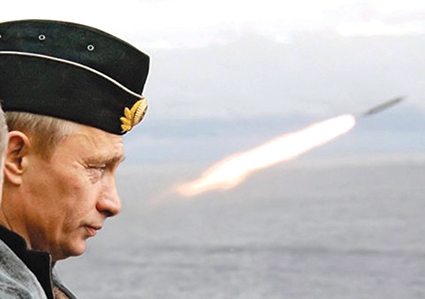Russia: Changing Suits for Uniforms?
Op-Ed
The impression is that the hot times of the Cold War have bounded back: Russia is flexing her nuke muscles, America has dug in, contemplating how to react, and the entire world is in suspense, waiting for something interesting but not very pleasant to happen. Actually, the picture has not changed since the Second World War, except that the universally hated monstrous geopolitical conglomerate, called the USSR, collapsed. Russia has not changed from times immemorial, with her plutocratic elite still at the helm and the underprivileged poor still in rags, a bitten-off loaf underarm.
A couple of days ago, right before the Russian presidential elections, the current Russian President made his annual State of the Nation speech, having dedicated, at the very least, 30% of the address to boosting Russia’s military might in the eyes of the world. Russia might really have developed a scary new lethal weapon, but why did Putin try to give the bloodcurdling news to the planet in such a stentorian tone? The Russian President probably intended to be heard by his drowsy electorate at home and the eternally smiling cynical America abroad. The domestic audience fell under a crucial impression, reinventing mother-Russia as a decision-making superpower, while Washington lackadaisically mumbled something totally incomprehensible under its unperturbed nose.
US-Russian relations are overly tense even without additional exacerbation, and, therefore, what Putin said serves to give the nuke-loaded world a huge new headache. Both Russia and the States currently deploy thousands of nuclear warheads and both store thousands more. In a word, Russia and America have the ability to mutually penetrate their missile defenses and destroy each other, and, consequently, the world, within 24 hours, and they do not necessarily need new weapons to do so. The only thing that matters here is the global recognition of nuclear weapons as a war deterrent, not an instrument. Putin’s recent speech before the Russian legislators will not lower tensions between the two nuclear superpowers; it will only abet the military hawks on both sides to go for more and better guns.
It is said that life is failing to improve in Russia. Russians have been living in perpetual expectation of a good life for centuries. Recollecting the recent times, an average soviet person was capable of tolerating any kind of hardship for the sake of the glory of the soviet motherland, and Russians made the best example of that heroism for other soviet nationalities and ethnicities. The soviets were permanently kept under the fright of the non-existent American threat, which was necessary for creating an impression that all soviet efforts should be spent on defending the country from American imperialism and capitalistic offensive, including the military one. Putin, as the greatest protector of the Russian people, who has no way to make life better for his historically patient compatriots, has restored the old soviet way of keeping the American threat up and going, telling his people that he will “make the West listen to Russia” again. Yes, Putin needs attention, global attention, to make the former Russian greatness the case again today. But the question is whether this is good news for the average Russian voter. Delighting the Russian people with a happy economic prognosis is practically impossible, as they all know where they are and what they are doing – even in Russia, information is not restricted to the public. Incidentally, the reaction of the Russian media to Putin’s speech was mixed.
Directing fellow citizens’ mentality towards the danger of war might be politically advantageous, thus distracting them from their everyday problems, but the perfidious guile kills the opportunity of ruling the country to the benefit of the people who truly need to behold at least a twinkle of light at the end of the tunnel.
The invincibility of Russia is the main Russian ideal, served by the entire nation more faithfully than any other thought that might earn the attention of a regular global citizen, like giving bigger preference to jobs and security against weapons and a bad life. Putin’s frightening comments on the latest Russian military achievement seek to drag the world back into the arms race.
Right at the moment when the world had almost forgotten the existence of intercontinental ballistic missiles, we are faced again, right out of the blue, with the same disturbing talk about nuclear threats and proliferation, and the possibility of a third world war, although Putin says he does not need weapons for war – he needs them to invite America to the negotiation table where the current Russian concerns would be heard.
I hate to call Russia a rogue state, but I am compelled to, but I am still hopeful that a massive Russian nuclear attack is not possible, imagining that the nuclear deterrence potential is in no way in danger. The challenge is serious, and people need to cope with it!
Nugzar B. Ruhadze












